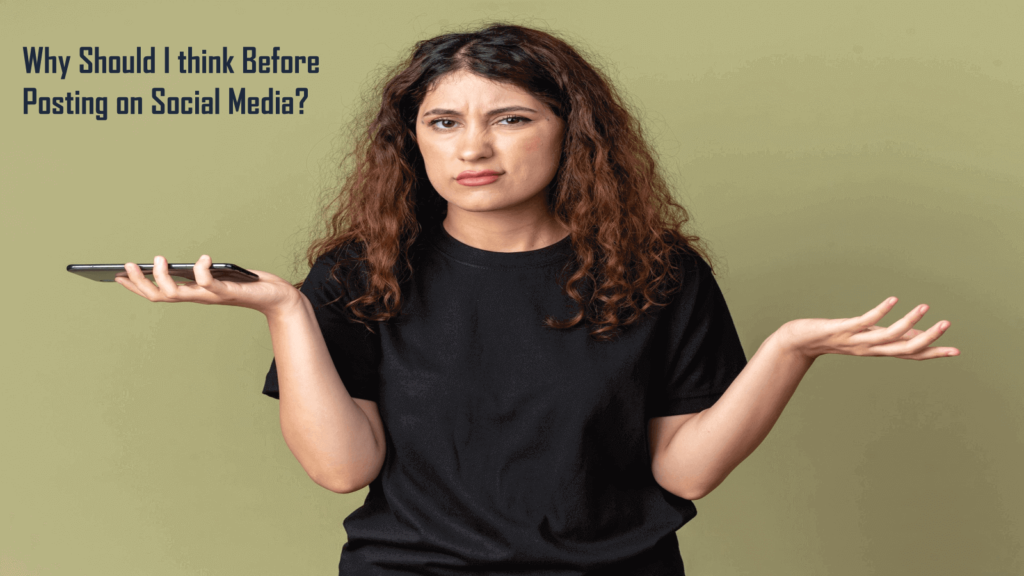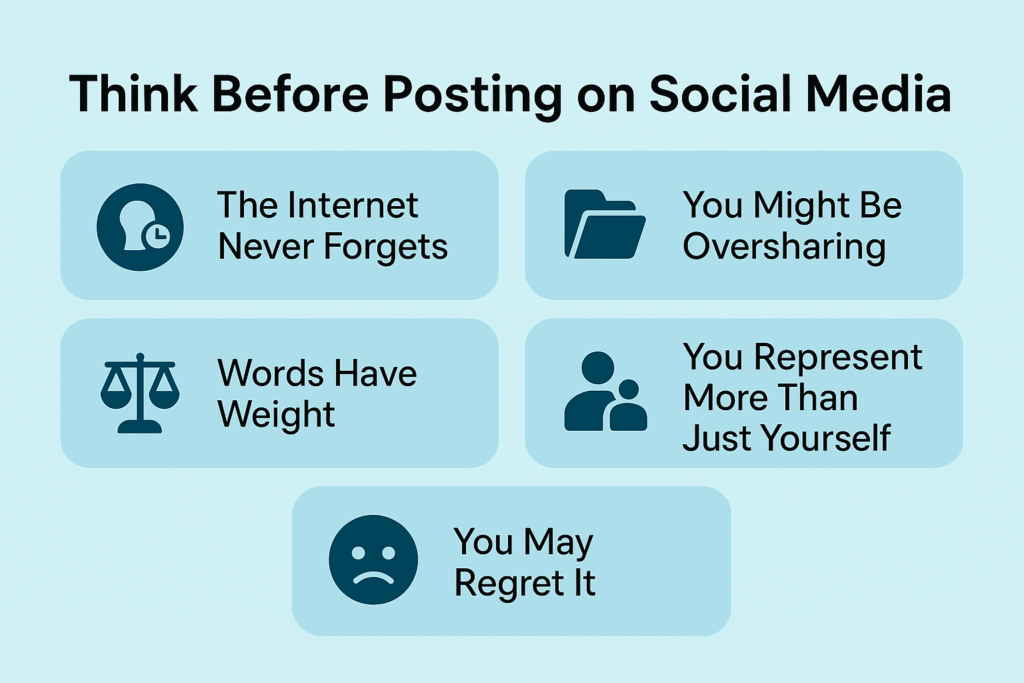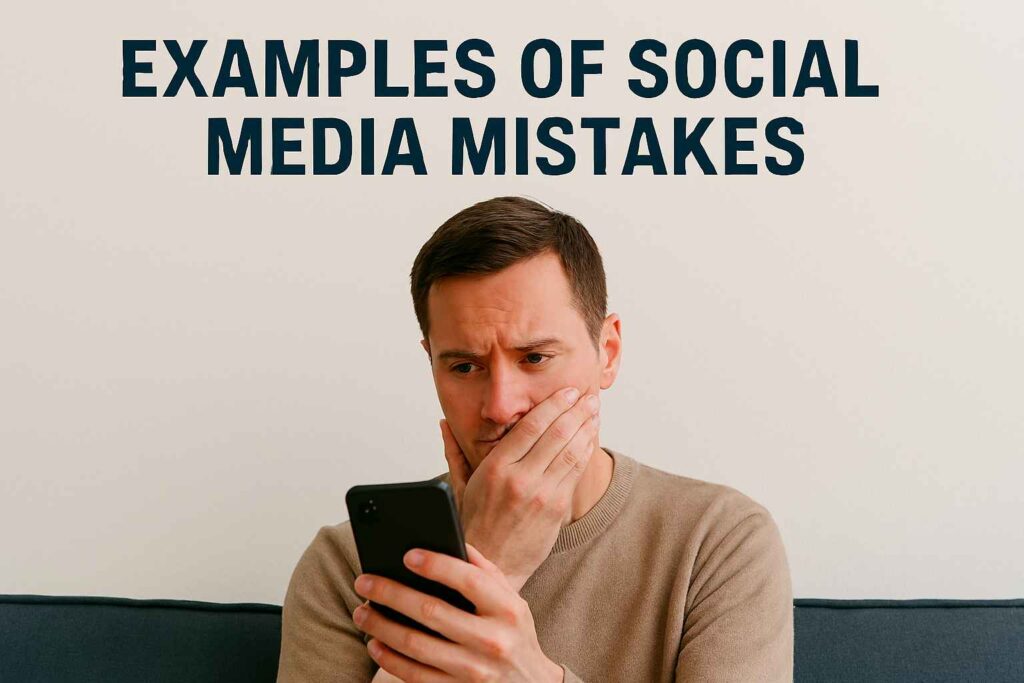
We can help ourselves to a zealous amount of freedom while posting. There is also a huge responsibility that comes with it. As the saying goes, ‘With great power comes great responsibility,’ and each of us has a personal obligation and duty to maintain the grace and dignity of the society we live in. In the virtual or online world, what we ‘speak’ can be unfathomably injurious, cataclysmic in perception, can wound someone deeply, all amount to serious ramifications that were not intended.
The risk of impulsive posting is that it most likely skips over reflection. With unrestrained posting, there is a a big chance that it is done thoughtlessly with zero contemplation. The ease of typing on a keyboard leads to some users to to want to grab the attention of others. The very fact that the internet is a faceless platform leads to the ability for users to type the very words that Mr. Gates would not say in a real face to face interaction.
Even journalists, critics, or influencers get caught up in this trap. Since they’re speaking about individuals not physically present before them, it’s simple to lose sight of the fact that those “subjects” are actual human beings with feelings. That distance can generate a culture where mean-spirited or hyperbolic language is okay. But what’s written thoughtlessly online doesn’t just disappear; it forms reputations and relationships.
So when you’re about to post, ask yourself: If this were said about me, would I be comfortable with it? If not, it’s an automatic flag that it shouldn’t be online.
Read More: What Does NFS Mean on Wizz?
Why should i think before posting on social media : 5 Reasons

Think before you post, as Social networking is such a megaphone. Whatever you post online can be heard by so many more people than you would have imagined. Sometimes it even lands on the ears of strangers you never intended to hear it by.
That’s why it pays to take a moment before posting. It takes only a few seconds of thinking to spare your privacy, reputation, and friendships.
It doesn’t imply that you must be paranoid or afraid. It just requires you to be wise, cautious, and considerate, where nothing ever actually goes away.
Below are the 5 Mian reason for you to think before when you posting anything on social media
The Internet Never Forgets
– Once you put something online, it can be screenshotted, shared, and archived, even if you end up deleting it afterwards.
– A thoughtless post can come back to haunt you years later, impacting job opportunities, relationships, or public opinion.You Might Be Oversharing
– Your pet names, location, or even your favorite color might be helpful hints for hackers to crack passwords or security questions.
– Posting too much can also expose you to identity theft or cyber stalking.Words Have Weight
– Something you write in anger or sarcasm can be interpreted in a wrong way and hurt people unintentionally.
– Everything gets amplified on social media—what you post can reach thousands, if not millions, in a split second.You Represent More Than Just Yourself
– As a student, employee, or business owner, what you post is representative of your school, company, or brand.
You May Regret It
– Emotional updates posted while acting on impulse tend to end in regret.
– Pausing for reflection can prevent you from suffering long-term repercussions.
What to consider before sharing with connections?
Whether it’s posting life news, views, or pictures, social sites like Facebook, Instagram, Twitter, and LinkedIn allow you to stay connected. But before you press “post,” recall this: what you put up can get you into serious trouble offline.
Read about: FastDl App: Best Instagram Photos Videos Downloader 2025
When you share something on the web, it’s not only your followers and friends who could be exposed to it. Your content may also be accessed by strangers, hackers, or even script bots intending to steal data. That’s why it’s more vital than ever before to safeguard your privacy—particularly with the increased threat of identity theft.
Think Before You Click "Post": 4 important points

Here are several compelling reasons you should consider before sharing it with your connections:
1. The Permanence of Digital Footprints:
Your digital footprint is permanent, and what you post today can come back to haunt you years later. Whatever you post remains online permanently, even if you do delete it. Screenshots, cached copies, and archives make it so once information gets out there, it’s almost impossible to completely get rid of.
This persistence has dire consequences. A classic example is when celebrity guests lose a chance due to something they uttered a long time ago. Jeopardy!’s host quit after saying something on a podcast 10 years prior came back to haunt them. It illustrates that time does not wipe out online errors.
That’s why irresponsible oversharing on the web has been referred to as “future suicide.” We tend to post things when we’re frustrated, joking, or irresponsible, and then come back to haunt us later—either in our romantic relationships, professional lives, or public reputation.
When you think twice and then hit “post,” you’re safeguarding your future self. Remember: the internet never forgets.
2. Protecting Your Private Life:
Personal privacy is one of the most precious things you should guard in the online world. Sustaining personal privacy is important because not all aspects of your life should be open information. Oversharing exposes you to not just criticism but exploitation as well.
Physical and financial security is also at risk. There are hackers, spammers, and “info-miners” who are looking all the time for information such as your location, phone number, or email address. Even a quick holiday photo could inadvertently give away that your house is unoccupied and you will become a target.
Then there’s the problem of possible misunderstandings and offended feelings. A cryptic post, rant, or in-joke can quickly be misinterpreted and have friends or family misunderstanding your meaning. What you intended as innocent could ignite unnecessary conflict or resentment.
Most of us, including myself, have learned the hard way. I used to write something late at night when I was not satisfied with my job, and friends misconstrued that. That one moment of careless writing lost me relationships that mattered. Others have described “fake friends” who feigned interest only to do research online—subsequently using it against them in mean forms.
That is why it is best to refrain from posting personal information such as your specific location, your habits, or a great deal about your family. Less online equals more protection offline.
3. The Professional Consequences of Posting Without Thinking:
Your digital activity reflects on you professionally. Employers, clients, and collaborators frequently look up candidates on social media before deciding. Posting spontaneously about your job site, co-workers, or aggravations can harm your career—even if you delete it later.
I’ve had regret myself here: I once complained about work online and missed an event because of it. What had seemed like a harmless rant was misinterpreted, and I lost respect from both friends and professional contacts.
Discretion, maturity, and sound judgment are what the professional world prizes. One wild tweet, meme, or remark can overshadow decades of diligence. But conversely, taking social media in a positive direction—such as posting accomplishments, perspectives, or motivating materials—can reinforce your reputation and draw opportunities towards you.
4. The Emotional and Mental Impact:
Words do hurt, and once uploaded to the internet, cannot be undone. Most people upload impulsively for self-validation, but in seeking popularity and likes, most times end up posting degrading content that knocks others down—making fun of someone’s appearance, religious orientation, or way of living. The outcome is never a nice one, and the damage usually trumps the fleeting popularity.
On the victim’s side, online cruelty can cause long-term emotional scars. When you find yourself being cyberbullied or when your private status gets manipulated against you, it causes stress and anxiety, and an attitude of mistrust towards others. I have experienced situations where individuals I thought were friends turned against me using personal information I had posted online—becoming bullies rather than supporters. That hurt lingers and makes it more difficult to believe in people later on.
Even hacks and data breaches can have their cost. I’ve been hacked several times, losing accounts and personal information. It really drove home the value of not sharing so much and keeping my most sensitive information offline..
Examples of social media mistakes: think before post

What you post on social media can last forever. Once it’s out there, it can be screenshotted, shared, or archived—long after you’ve deleted it. These real-life examples show why it’s so important to think before clicking “post.”
- Burger King UK
What Was Posted: Tweeted “Women belong in the kitchen” on International Women’s Day.
Outcome: Huge backlash → tweet deleted + public apology issued.
Reference: Business Insider Forbes
- Johnson & Johnson (Motrin)
What Was Posted: “Motrin Moms” ad used a sarcastic tone about baby-wearing.
Outcome: Angered mothers online → ad pulled + Motrin site temporarily taken down.
Reference: WIRED
- Bioré
What Was Posted: TikTok ad where influencer mentioned surviving a school shooting to promote pore strips.
Outcome: Heavy criticism → video deleted + brand admitted poor oversight.
Reference: Business Insider
- Listerine
What Was Posted: Influencer campaign (Scarlett London) seen as fake and staged.
Outcome: Backlash over inauthenticity → influencer and brand criticized.
Reference: Influencer Update
- Audi
What Was Posted: #PaidMyDues campaign focused on creators, not cars.
Outcome: Felt off-brand → engagement dropped.
Reference: SMK
- Ryanair
What Was Posted: Snarky post about Prince William.
Outcome: Kensington Palace complained → tweet deleted.
Reference: Business Insider
- Queensland Symphony Orchestra
What Was Posted: Facebook ad with poor AI artwork.
Outcome: Mocked by public → seen as unprofessional.
Reference: The Guardian
Conclusion: Think Before You Post
It’s not just advisable, it’s imperative to stop and consider the ramifications of posting on Social Media. Each Post curates a part of your digital footprint, and defending a position toward that can hugely help in determining how others will view you in the future, your prospects, and even your inter personal relations along with your reputation. So before you type “share,” ask yourself: Is this true? Is it respectful? Is it necessary? Because once it’s out there, it’s out there for good.
Want to turn this into a punchy blog outro or meme-style visual? I’ve got ideas locked and loaded.